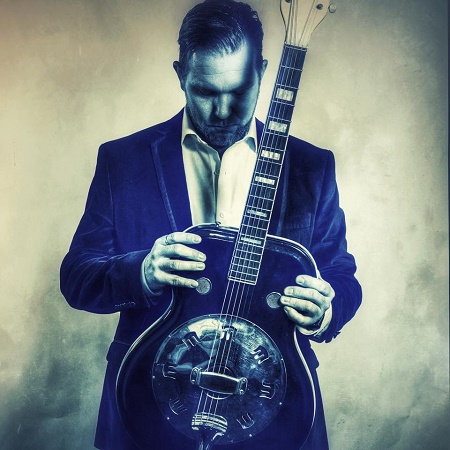It’s been almost 25 years since Kenny Wayne Shepherd released his sophomore album, “Trouble Is…,” but the record is still reverberating. On the back of the hit single “Blue on Black,” the album rocketed the blues guitarist, just 20 at the time, into the mainstream. The Louisiana native has gone on to multiple Grammy nominations, collaborations with everyone from Buddy Guy to Stephen Stills and is a regular headliner at blues festivals all over the world — including his Saturday, July 9 event-closing set at Briggs Farm Blues Festival in Nescopeck, Pa. — and his current run of dates is a celebration of the 25th anniversary of that seminal album.
In advance of his Briggs performance, which is to precede his six-city Backroads Blues Festival (including Aug. 14 in Bethel, NY) alongside Guy and Briggs alumni Christone “Kingfish” Ingram, Shepherd chatted with us about how “Trouble Is…” changed the arc of his career, the state of electric guitar in today’s music scene and a new album slated for release next year.
What does that “Trouble Is..” mean to you and what role has it played in your career?
It was a monumental record for us, I think for the genre as well. That album still holds the record for the longest No. 1 blues record in the history of the blues charts, and when “Blue on Black,” the single at the time, we set the record for the most consecutive weeks at No. 1 for the history of the Billboard rock charts. I think it was a monumental record. For me, for my career, we were already kind of riding the wave of the success of the first album and this one just kicked it into the next gear and it opened up my fanbase to a lot more people. The beauty of that is when you’re doing this kind of music — which I believe to be timeless music, it’s not trapped in a specific era, it’s not pop music that tends to change and fall out of trends, people generally become fans of this kind of music and are for the most part fans for life. The same people that found out about us 25 years ago with this record or almost 30 years ago with the first album, a lot of them are still fans today and still come to our concerts and stuff. So I don’t the importance of this album could be underestimated and I think also the music stands on its own. I talk to a lot of people doing interviews about this, and the overall consensus is we could record this same album and put it out today as the new album and it would sound just as relevant.
You’ve worked with legends such as BB King and Buddy Guy, but you’ve also been collaborating with younger blues stars like Samantha Fish and Kingfish. Do you think it’s important to keep the thread going from the old school through you to the next generation?
Yeah, absolutely man. That’s how the music continues to thrive. And it’s a good example, people like BB King, he was king of the blues. It didn’t get any bigger for that genre than BB King, and he was the most welcoming individual that you would ever meet for me. He was not selfish, he was encouraging to everyone, but certainly to me. He welcomed me in, treated me like one of the guys, gave me so much advice and encouragement and played a big role in my life and my career, so I think that’s how you continue for the music to thrive: encourage the next generation to come in and treat them well and encourage them to do their own thing, and that genre will continue to grow.
When you got started, there was an infrastructure in place with major labels, MTV, VH1 and rock radio. That has changed as the market has pivoted to streaming. What advice would you give you younger musicians getting started today?
I would say by the ‘90s things like MTV, they were becoming more about reality television than music. In the ‘80s, somebody like Stevie Ray Vaughan really benefited from MTV because MTV was just looking for content and they would play the crap out of stuff, and he got a lot of airtime. By the time I came around MTV was a lot less relevant when it came to actual music content. So, the whole thing is different now. Back then you had to sign to a label, you needed a label because they had the money, they had the resources, they had the connections to market, they had the connections to get it played on the radio and that would generally translate to album sales if the music was good enough. But today, the whole thing has been upended. So young people today have so many resources at their fingertips with basically little to no cost. I mean, your new laptop computer comes with recording software on it. Social media allows you to grow your own audience, market your brand and directly to them and engage them in what you’re doing. You don’t need a record company for that, you just need to be good at marketing yourself and working those platforms. So that’s two huge things. And you can put your own music out. You can put your own music out directly to iTunes, you can get it out there via YouTube, Spotify, Soundcloud, all these kinds of things, so you don’t even need [labels] for distribution. So it’s interesting how it’s all changed but there’s still a lot of work that falls on you the artist if you want to go about it that way. So I think nowadays there’s more power in the hands of the unknown artist than ever before. I don’t think the record company is necessarily the be all end all, for sure. It helps in certain ways. They have the ability to control their future and their destiny like never before, so I think that’s pretty interesting to me. The thing that saddens me is it was the end of album sales. When my first album came out, my first two albums went platinum, the third one I think is almost platinum now, I have platinum and gold records hanging on my wall, and for this genre, I don’t think that’s ever going to happen again because nobody buys records. Some of our fans buy physical product because they grew up doing that, but the next generation won’t. It’s all about streams.
If you look at the charts today, there isn’t a lot of guitar in the songs, even in the rock songs. Do you think the electric guitar is almost becoming an artifact?
Well I think you have to look for a different kind of rock. Traditional rock music, blues-based music, like heritage-type rock, there’s no home for it on the radio anymore and therefore it doesn’t end up on the charts. You have to look for the heavy rock or borderline metal music, the heavier bands, Five Finger Death Punch, Shinedown, people like that, and there’s plenty of guitar in all of that stuff. There may not be a lot of guitar solos, but all that stuff is heavy guitar-driven music. So guitar still plays a role for sure, obviously it’s not so much in pop music, they’ve been gradually trying to get rid of guitar in pop music for so many years. But I will say this, over the course of the pandemic, Fender, which I use their guitars, Fender sold more guitars in 2020 and probably in 2021 then they ever have in the history of the business. So people at home with all spare time on their hands were turning to instruments, and the guitar in particular, and I have to believe that we’re going to see something come from that. With that many people buying instruments and spending time with them in their hands and it not have an effect on what is to come, so I think it’s going to be pretty interesting to see what comes from that. But there were stories like 10, 15 years ago that guitar was 10, I think John Mayer even tried to say that guitar was dead or whatever, and Fender just sold more guitars in the past two years than they ever have, so guitar really is not dead.
Do you still practice the guitar? Are you still a student of the instrument?
Yeah. Yes, I think you’re forever a student of the instrument. I don’t care who you are, there’s always somebody who can do something that you cant do, so that’s inspiring, it’s humbling. So I certainly have plenty of stuff that I can spend time learning and improving on. There’s guys even in my own genre that do things that I don’t do and I can sit down and try to figure that out. There’s almost so much more to learn.
Do you have any new music coming out?
Yeah, towards the end of this year we’re going to be putting out some product, some video and some msci stuff that’s all relate to the 25th anniversary of the “Trouble Is…” record, and then we already have an entirely new record that we recorded right before COVID, everything shut down. We had just finished a record that was supposed to come out for the end of 2020, so we have just been holding onto it because I didn’t think that it made any sense to put it out until all of this was resolved. So next year, I don’t have a date yet, I want to say in the first half of next year we’ll be putting out a record.




Leave a Reply